
The green wood hoopoe is a large, up to 44 cm (17 in) long tropical bird native to Africa. It is a member of the family Phoeniculidae, the wood hoopoes, and was formerly known as the red-billed wood hoopoe.
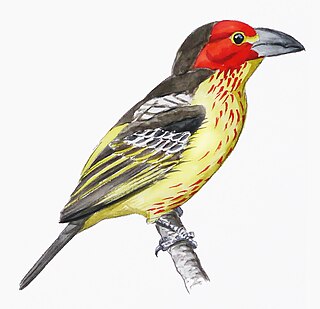
Vieillot's barbet is a small bird in the family Lybiidae. Barbets are a group of near passerine birds with a pantropical distribution which get their name from the bristles which fringe their heavy bills. This bird is named after the French ornithologist Louis Pierre Vieillot.

The yellow-fronted tinkerbird is a small bird in the family Lybiidae formerly known as yellow-fronted tinker barbet. It is sometimes considered conspecific with its southern counterpart, the red-fronted tinkerbird, Pogoniulus pusillus. Barbets are near passerine birds with bristles around the base of the bill and a world-wide tropical distribution.

Bennett's woodpecker is a species of bird in the family Picidae. It is found in woodlands and bushes in Africa. The International Union for Conservation of Nature (IUCN) has assessed it as a least-concern species.

The grey-throated barbet is a species of bird in the Lybiidae family . It is found in Angola, Cameroon, Central African Republic, Republic of the Congo, Democratic Republic of the Congo, Equatorial Guinea, Gabon, Kenya, Rwanda, South Sudan, Tanzania, and Uganda.

The naked-faced barbet is a bird species in the family Lybiidae. It used to be placed in the family Bucconidae (puffbirds), which has been split up; alternatively, it may be included in a vastly expanded Ramphastidae (toucans).

The bristle-nosed barbet is a bird species in the family Lybiidae. It used to be placed in the family Bucconidae (puffbirds), which has been split up; alternatively, it may be included in a vastly expanded Ramphastidae (toucans).

The lesser honeyguide is a species of bird in the family Indicatoridae. Like other honeyguides, it is a brood parasite that lays eggs most commonly in the nests of African barbets, but will also occasionally use the nests of other birds as well, such as starlings and woodpeckers.

The double-toothed barbet is a species of bird in the family Lybiidae. It is found in Angola, Benin, Burundi, Cameroon, Central African Republic, Republic of the Congo, Democratic Republic of the Congo, Ivory Coast, Equatorial Guinea, Ethiopia, Gabon, Ghana, Guinea, Guinea-Bissau, Kenya, Liberia, Mali, Nigeria, Rwanda, Sierra Leone, South Sudan, Tanzania, Togo, and Uganda. Within Lybius bidentatus, there are two subspecies: Lybius bidentatus bidentatus and Lybius bidentatus aequatorialis.
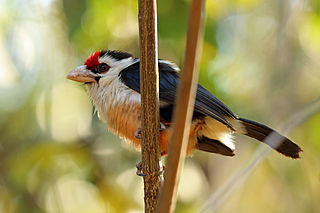
The white-faced barbet or black-backed barbet is a species of bird in the Lybiidae family. It is found in Gabon, Angola, Zambia, Republic of the Congo and Democratic Republic of the Congo. The habitat it is normally found in is riverine woodland and forest edges.

The black-collared barbet is a species of bird in the family Lybiidae which is native to sub-Saharan Africa. Indigenous names include Rooikophoutkapper in Afrikaans, isiKhulukhulu and isiQonQotho in Zulu, and Isinagogo in Xhosa.

The red-crowned barbet is part of one of the two subfamilies of Megalaimidae birds. it is in the order of woodpeckers (Piciformes) and their relatives. It is distributed in Myanmar, Thailand, Malaysia, Singapore, Indonesia and Brunei. Its natural habitats are subtropical or tropical moist lowland forests and plantations with a distribution area of 3,180,000 km2 (1,230,000 sq mi).
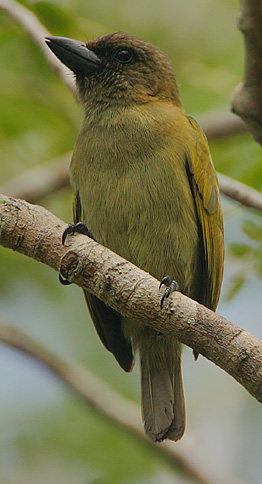
The green barbet is a species of bird in the Lybiidae family. It is found in Kenya, Tanzania, Malawi, Mozambique and South Africa. It occurs in forests from sea level to 1,800 metres (5,900 ft). Its isolated populations are vulnerable to forest clearing.
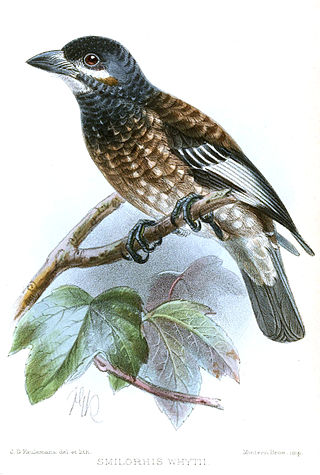
Whyte's barbet is a species of bird in the family Lybiidae. It is found in Malawi, Mozambique, Tanzania, Zambia, and Zimbabwe.

The Usambiro barbet is a species of bird in the African barbet family Lybiidae. It was formerly considered a subspecies of D'Arnaud's barbet, along with Emin's barbet, but was split as a distinct species by the IOC in 2021. It varies from the nominate in having a longer wing, shorter tail, darker bill. The Usambiro barbet was originally described as a subspecies of D'Arnaud's barbet in 1908 by Oscar Rudolph Neumann from a specimen collected in Usambiro in Tanzania. It is now treated as a valid species in its own right.

The crested barbet is a sub-Saharan bird in the Lybiidae family. Its specific name commemorates François Levaillant, a famed French naturalist.
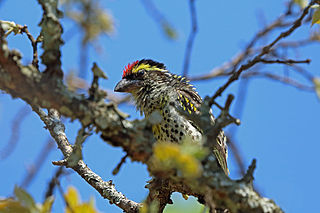
The miombo pied barbet is a species of bird in the family Lybiidae. It is found in south-central Africa.
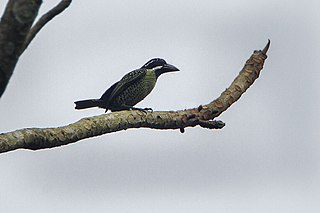
The hairy-breasted barbet is a species of bird in the family Lybiidae. It is found throughout the African tropical rainforest.

Bates's paradise flycatcher is a passerine bird belonging to the monarch-flycatcher family, Monarchidae. The sexes are similar in appearance with the upper parts being rufous and the head and underparts being bluish-grey. It is native to central Africa where it is found in the understorey of forests.

Argyropelecus sladeni, or Sladen's hatchetfish, is a species of ray-finned fish in the family Sternoptychidae, found in the tropical and subtropical Atlantic, Indian and Pacific Oceans. This small fish lives in the mesopelagic zone by day and makes a daily vertical migration to the epipelagic zone at night.




















